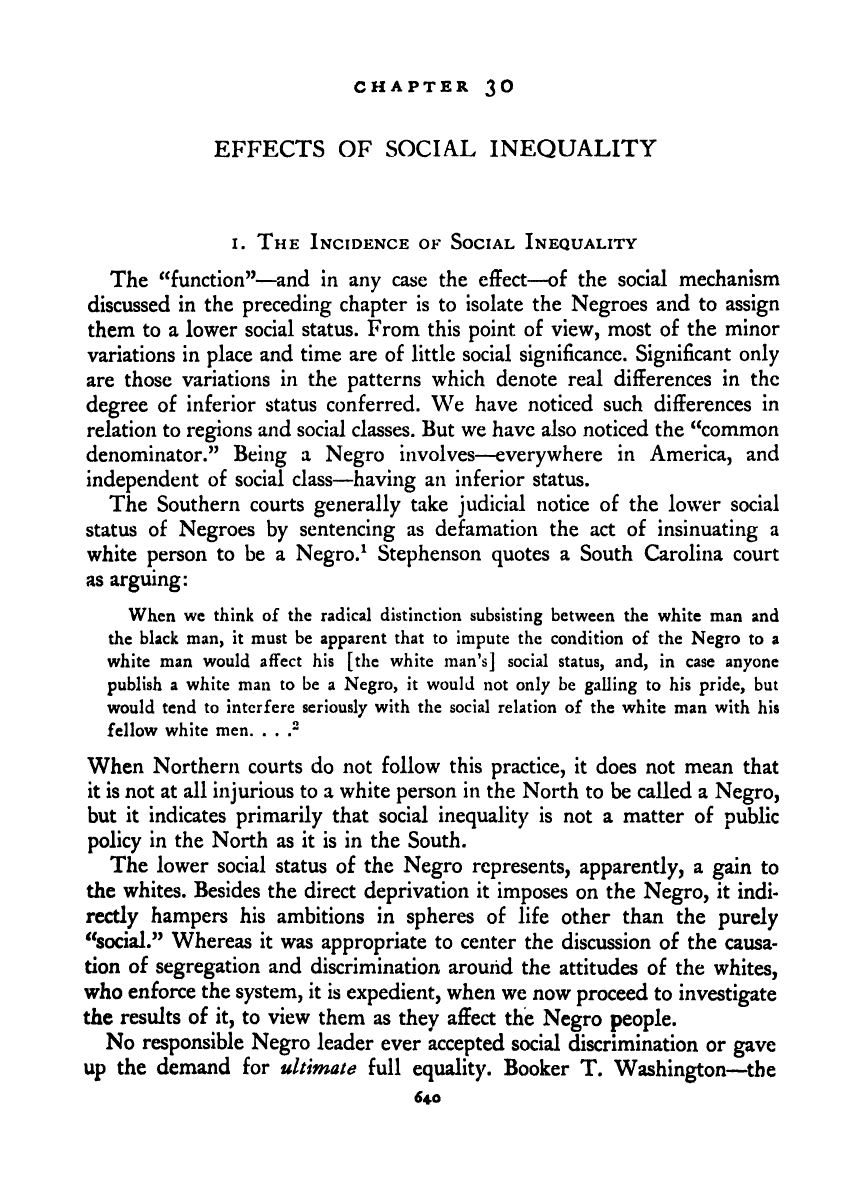Note: Gunnar Myrdal died in 1987, less than 70 years ago. Therefore, this work is protected by copyright, restricting your legal rights to reproduce it. However, you are welcome to view it on screen, as you do now. Read more about copyright.
Full resolution (TIFF) - On this page / på denna sida - VII. Social Inequality - 30. Effects of Social Inequality - 1. The Incidence of Social Inequality

<< prev. page << föreg. sida << >> nästa sida >> next page >>
Below is the raw OCR text
from the above scanned image.
Do you see an error? Proofread the page now!
Här nedan syns maskintolkade texten från faksimilbilden ovan.
Ser du något fel? Korrekturläs sidan nu!
This page has never been proofread. / Denna sida har aldrig korrekturlästs.
CHAPTER 30
EFFECTS OF SOCIAL INEQUALITY
I. The Incidence of Social Inequality
The ^^function”—and in any case the effect—of the social mechanism
discussed in the preceding chapter is to isolate the Negroes and to assign
them to a lower social status. From this point of view, most of the minor
variations in place and time are of little social significance. Significant only
are those variations in the patterns which denote real differences in the
degree of inferior status conferred. We have noticed such differences in
relation to regions and social classes. But we have also noticed the ‘‘common
denominator.” Being a Negro involves—everywhere in America, and
independent of social class—having an inferior status.
The Southern courts generally take judicial notice of the lower social
status of Negroes by sentencing as defamation the act of insinuating a
white person to be a Negro.^ Stephenson quotes a South Carolina court
as arguing:
When we think of the radical distinction subsisting between the white man and
the black man, it must be apparent that to impute the condition of the Negro to a
white man would affect his [the white man’s] social status, and, in case anyone
publish a white man to be a Negro, it would not only be galling to his pride, but
would tend to interfere seriously with the social relation of the white man with his
fellow white men. . . r
When Northern courts do not follow this practice, it does not mean that
it is not at all injurious to a white person in the North to be called a Negro,
but it indicates primarily that social inequality is not a matter of public
policy in the North as it is in the South.
The lower social status of the Negro represents, apparently, a gain to
the whites. Besides the direct deprivation it imposes on the Negro, it indi-
rectly hampers his ambitions in spheres of life other than the purely
^‘social.” Whereas it was appropriate to center the discussion of the causa-
tion of segregation and discrimination arouiid the attitudes of the whites,
who enforce the system, it is expedient, when we now proceed to investigate
the results of it, to view them as they affect the Negro people.
No responsible Negro leader ever accepted social discrimination or gave
up the demand for ultimate full equality. Booker T. Washington—^the
640
<< prev. page << föreg. sida << >> nästa sida >> next page >>